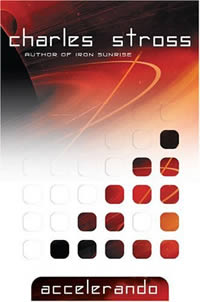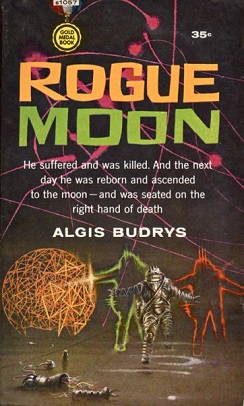Feminist science fiction is a subgenre of science fiction focused on such feminist themes as: gender inequality, sexuality, race, economics, reproduction, and environment. Feminist SF is political because of its tendency to critique the dominant culture. Some of the most notable feminist science fiction works have illustrated these themes using utopias to explore a society in which gender differences or gender power imbalances do not exist, or dystopias to explore worlds in which gender inequalities are intensified, thus asserting a need for feminist work to continue.
Science fiction and fantasy serve as important vehicles for feminist thought, particularly as bridges between theory and practice. No other genres so actively invite representations of the ultimate goals of feminism: worlds free of sexism, worlds in which women's contributions are recognized and valued, worlds that explore the diversity of women's desire and sexuality, and worlds that move beyond gender.

Theodore Sturgeon was an American fiction author of primarily fantasy, science fiction, and horror, as well as a critic. He wrote approximately 400 reviews and more than 120 short stories, 11 novels, and several scripts for Star Trek: The Original Series.

Philip José Farmer was an American author known for his science fiction and fantasy novels and short stories.
The Heechee Saga, also known as the Gateway series, is a series of science fiction novels and short stories by Frederik Pohl. The Heechee are an advanced alien race that visited the Solar System hundreds of millennia ago and then mysteriously disappeared. They left behind bases containing artifacts, including working starships, which are discovered and exploited by humanity.
Kilgore Trout is a fictional character created by author Kurt Vonnegut (1922–2007). Trout is a notably unsuccessful author of paperback science fiction novels.

"The World Well Lost" is a science fiction short story by American writer Theodore Sturgeon, first published in the June 1953 issue of Universe. It has been reprinted several times, for instance in Sturgeon's collections E Pluribus Unicorn, Starshine, and A Saucer of Loneliness. The story takes its title from the subtitle of John Dryden's verse drama All for Love.

Peter Watts is a Canadian science fiction author. He specializes in hard science fiction. He earned a Ph.D. from the University of British Columbia in 1991 from the Department of Zoology and Resource Ecology. He went on to hold several academic research and teaching positions, and worked as a marine-mammal biologist. He began publishing fiction around the time he finished graduate school.

Accelerando is a 2005 science fiction novel consisting of a series of interconnected short stories written by British author Charles Stross. As well as normal hardback and paperback editions, it was released as a free e-book under the CC BY-NC-ND license. Accelerando won the Locus Award in 2006, and was nominated for several other awards in 2005 and 2006, including the Hugo, Campbell, Clarke, and British Science Fiction Association Awards.

Saturn has made appearances in fiction since the 1752 novel Micromégas by Voltaire. In the earliest depictions, it was portrayed as having a solid surface rather than its actual gaseous composition. In many of these works, the planet is inhabited by aliens that are usually portrayed as being more advanced than humans. In modern science fiction, the Saturnian atmosphere sometimes hosts floating settlements. The planet is occasionally visited by humans and its rings are sometimes mined for resources.

Rogue Moon is a short science fiction novel by Lithuanian-American writer Algis Budrys, published in 1960. It was a 1961 Hugo Award nominee. A substantially shortened version of the novel was originally published in F&SF; this novella-length story was included in The Science Fiction Hall of Fame, Volume Two, edited by Ben Bova. It was adapted into a radio drama by Yuri Rasovsky in 1979.

The World Jones Made is a 1956 science fiction novel by American writer Philip K. Dick, examining notions of precognition, humanity, and politics. It was first published by Ace Books as one half of Ace Double D-150, bound dos-à-dos with Agent of the Unknown by Margaret St. Clair.The story takes place after a nuclear war in which society is dominated by relativism, which rejects absolute truths and preaches tolerance as the highest principle. The mutant Flyod Jones, who can see into the future, plans to overthrow the system and colonise space. The story ends with the defeat of Jones, whose plans fail despite his ability to see the future due to the immutability of fate.

"The Scapegoat" is a science fiction novella by American writer C. J. Cherryh, set in her Alliance-Union universe. It deals with a war in which the two opposing species can not communicate with one another and do not know how to stop the conflict. The work was originally published in the 1985 anthology of military science fiction Alien Stars and was nominated for the Hugo Award for Best Novella.

Charlie Jane Anders is an American writer specializing in speculative fiction. She has written several novels as well as shorter fiction, published in magazines and on websites, and hosted podcasts; these works cater to both adults and adolescent readers. Her first science fantasy novels, such as All the Birds in the Sky and The City in the Middle of the Night, cover mature topics, received critical acclaim, and won major literary awards like the Nebula Award for Best Novel and Locus Award for Best Science Fiction Novel. Her young adult trilogy Unstoppable has been popular among younger audiences. Shorter fiction has been collected into Six Months, Three Days, Five Others and Even Greater Mistakes.

The Dreaming Jewels (1950), also known as The Synthetic Man, is a science fiction novel by American writer Theodore Sturgeon. It was his first published novel.
The 20th World Science Fiction Convention (Worldcon), also known unofficially as Chicon III, was held on 31 August–3 September 1962 at the Pick-Congress Hotel in Chicago, Illinois, United States.

Flowers for Algernon is a short story by American author Daniel Keyes, which he later expanded into a novel and adapted for film and other media. The short story, written in 1958 and first published in the April 1959 issue of The Magazine of Fantasy & Science Fiction, won the Hugo Award for Best Short Story in 1960. The novel was published in 1966 and was joint winner of that year's Nebula Award for Best Novel.
"Slow Sculpture" is a science fiction short story by American writer Theodore Sturgeon. First published in the Galaxy Science Fiction issue of February 1970, it won the 1970 Nebula Award for Best Novelette and the 1971 Hugo Award for Best Short Story.

The Angry Espers is a science-fiction novel written by Lloyd Biggle, Jr. and published by Ace Books as half of Ace Double #D-485 in 1961. The novel first appeared in the August 1959 issue of Amazing Science Fiction Stories as A Taste of Fire. In 1962 it was given Honorable Mention as a candidate for the Best Novel Hugo Award.

This Is How You Lose the Time War is a 2019 science fiction fantasy LGBT epistolary novel by Amal El-Mohtar and Max Gladstone. It was first published by Simon & Schuster. It won the BSFA Award for Best Shorter Fiction, the 2019 Nebula Award for Best Novella, the 2020 Locus Award for Best Novella, the 2020 Hugo Award for Best Novella, and the 2020 Ignyte Award for Best Novella.
"Omphalos" is a science fantasy short story by American author Ted Chiang. It is named after the Omphalos hypothesis and a 1857 book by English naturalist Philip Henry Gosse. It was first published in Chiang's 2019 collection, Exhalation: Stories.














